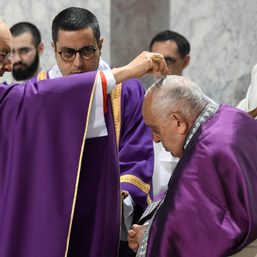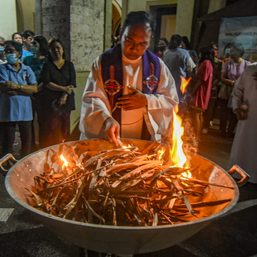SUMMARY
This is AI generated summarization, which may have errors. For context, always refer to the full article.
![[REFLECTION] Catholic guilt](https://www.rappler.com/tachyon/2024/03/catholic-guilt-march-8-2024.jpg)
Father Jordan Orbe, a Jesuit priest and a licensed psychologist, delivered this homily at the Jesuits’ Keep the Faith Mass on Wednesday, March 6. Rappler is republishing this with his permission.
Catholic guilt is a cliché often depicted in books, movies, and popular culture as this extreme fear or discomfort coming from a sense of breaking a rule or doing something bad.
One writer describes Catholic guilt as an “excess of healthy guilt” coming from a perfectionistic or black-or-white view of morality. Persons who are riddled with this form of guilt tend to be overly scrupulous, fearful, harsh, and judgmental primarily of themselves, but often of others, too. They feel that they are never doing enough to meet moral standards.
I have encountered folks whose extreme fear and moral guilt have led to an anxiety diagnosis. I know one person who is so afraid of dying because he is sure that he is going to hell. It is unfortunate that this idea of Catholic guilt, and the image of God as the ultimate guilt-tripper, gives the impression that our faith is deeply, and only, fear-based.
At first glance, our readings today seem to reinforce this black-or-white view, given the mention of observing statues, decrees, and the law. The Book of Deuteronomy recounts Moses’ heartfelt plea to the Israelites, urging them to remain faithful to God’s commandments. In the Gospel of Matthew, Jesus emphasizes the enduring value of God’s commandments.
As we read more closely, these readings point us to a more authentic perspective and a profound insight. Faith is not just a matter of making sure we do not break any rule. The statutes and decrees that we are enjoined to obey are meant to point to what is most valuable: our relationship with God. The commandments are not arbitrary rules but integral threads woven into the fabric of this loving relationship. When we love someone, the last thing we want to do is to hurt or displease them. And like all relationships, our encounter with God is dynamic, it ebbs and flows.
Moses reminds the people of Israel that observing the commandments will give evidence of their wisdom and intelligence coming from their closeness with God. Jesus declared that the fulfilment of the prophets and the law is not abstract perfection, but a person, with whom we can build a relationship. Our faith therefore should be more than just a process of ticking moral boxes or accomplishing a to-do list.
This season of Lent, we are used to doing penances and sacrifices. These are not ends in themselves. What is more important is whether these practices lead us to what is truly essential: being reconciled with God and be in right relationship with him.
The healthy way, then, to regard Catholic guilt is to see it not as an indictment and reason to beat ourselves up, but as a spiritual GPS, redirecting us towards the path of love and communion with God. It is a recognition that our actions, when contrary to our values, can strain our relationship with the Divine.
Let us pray that this season of Lent be a sacred time to reconcile, heal, and renew our relationship with God, who only wants to be close to us. Lent is not a time to showcase our spiritual and physical endurance through our penances and sacrifices. Lent is not about us and what we do. Lent is really about what God does in his great love and desire for us, that he is willing to undergo suffering out of Love.
May our Catholic guilt be transformed into a catalyst for deeper trust that draws us closer to the Divine love that knows no bounds. – Rappler.com
Father Jordan Orbe is the executive director of the Emmaus Center for Psycho-Spiritual Formation and Accompaniment. He holds a doctorate in clinical psychology from Loyola University Maryland, USA.
Add a comment
How does this make you feel?



![[ANALYSIS] The Lenten season and the market](https://www.rappler.com/tachyon/2023/04/lenten-season-market-april-6-2023.jpg?resize=257%2C257&crop_strategy=attention)
There are no comments yet. Add your comment to start the conversation.